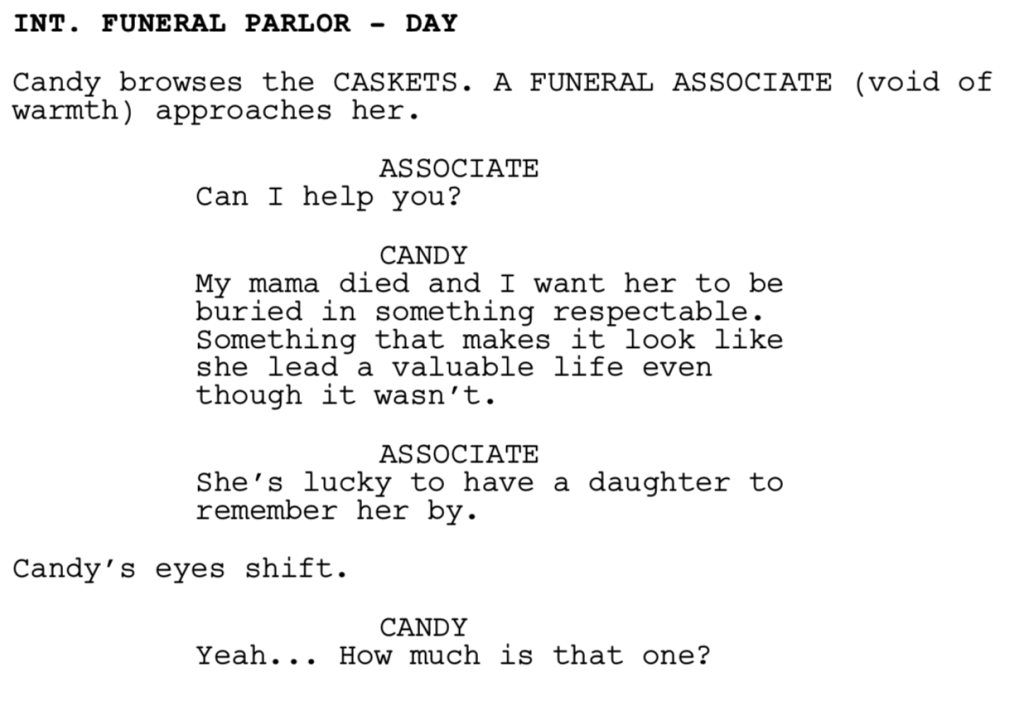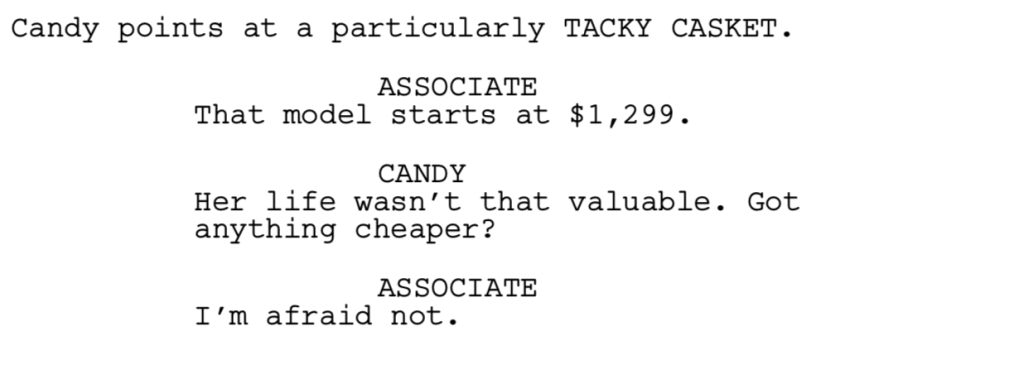Genre: Dark Comedy
Premise: When a jobless government subsidizing loser wins the Arizona lottery, he must figure out a way to divorce his hate-filled wife in order to keep the winnings for himself.
About: Today we have a 2018 Nicholl finalist (there were six finalists and four winners). Our lone 2018 Nicholl winning script review resulted in a tepid thumbs up. Will today’s script fare better?
Writer: Avi Glick
Details: 122 pages
A lottery win is one of the easiest ways to pull an audience into a story. Who isn’t fascinated by a character going from poor to stinking rich within a matter of seconds? Strangely, however, lottery-based ideas haven’t fared well in the marketplace. As easy as it is to begin their story, writers have trouble coming up with what happens next. My favorite lottery film ever is Waking Ned Devine. But after that, the pickings get slim. So when I saw that a lottery-centric script had made it to the Nicholl Finals, I approached it skeptically.
40-something Eddie lives in a trailer in Apache Junction, a downtrodden Native American community in Arizona. Eddie isn’t that smart. He doesn’t have a job and spends the majority of his income – income that comes from the government and his wife, Candy, who runs a Do-It-Yourself waxing business – on lottery tickets. Candy gave up on Eddie a long time ago, and these days only talks to him to remind him that she’s filing for divorce soon.
How ironic is it, then, that Eddie wins the lottery. 1.3 million dollars to be exact. No sooner has Eddie won the prize than he realizes he needs to hide it from his wife, who will most certainly divorce him and take half his winnings. So Eddie enlists the help of his greedy accountant, Shlomo, and, to keep Shlomo in check, Neo-Nazi Kelly Mc’Mc’N. Eddie’s plan is to give the ticket to them, have them claim it, then funnel the money back to him over time.
Meanwhile, Candy, who’s cheating on Eddie with his nudist brother, finds out she’s pregnant. Excited, scared, and confused, she heads over to her parents’ place, only to find out that her worthless mom is dead. Upon finding her, Candy discovers a lottery ticket in her mom’s hand – a WINNING lottery ticket. That’s right, there are TWO winning tickets, which, unbeknownst to each other, both Eddie and Candy now have.
Candy visits a local lawyer in order to plot a divorce whereby she doesn’t have to give Eddie a dime. Meanwhile, Shlomo and Kelly go searching for Eddie’s ticket behind his back, which isn’t difficult since everyone in town knows that Eddie’s secret hiding place is an abandoned trailer on the outskirts of town. This is followed by Candy’s lawyer plotting her own plan to get the money from Candy.
When Candy hits Eddie with the divorce, Eddie becomes convinced he still loves his wife. He hence sets out to buy his lifelong obsession, a yacht, despite the fact that there isn’t any water in Apache Junction. He figures that a man who owns a yacht is an important man, and that Candy would never want to divorce an important man. Of course, Candy’s got other stuff to deal with – like the fact that Shlomo and Kelly have learned that she possesses the other lottery ticket. Seeing as her involvement makes them 650 thousand dollars poorer, they’d like her to meet an untimely demise. Which is what they set about doing. Will they succeed? Will Candy end up with the money? Will Eddie? Will Candy and Eddie reconcile? Check out “A Yacht in The Apache Junction” to find out.
First off, big props to screenwriter Ari Glick. This man knows his audience. Within the first page we establish a disenfranchised minority people who America screwed over. We then mention Trump and Putin, border disputes, and school shootings! Talk about grabbing the Nicholl reader’s attention! I’m sure this one shot to the top of the pile after that page.
Luckily, Apache Junction isn’t yet another Nicholl social justice message disguised in a screenplay costume. It’s actually a really funny dark comedy about greed with some of the most fun and original characters I’ve read all year.
The writer’s biggest strength is how distinctive he makes all his characters. A Comanche cop living in an Apache region who reads The Power of Positive Thinking. A greedy Jewish accountant. A crazed Neo-Nazi who he must team up with. A wife who owns a self-waxing business. A fat nudist duplicitous brother. Every character here pops off the page.
I know what you’re going to say so stop your stampede to the comments section. “They’re just quirky for being quirky’s sake, Carrrrrson!” I agree with this critique when the execution of characters like this is lame. But there is no lame here. Every character is hilarious. I dare you to read this and not laugh out loud at least 15 times. It’s that funny.
I mean, at one point Candy, who doesn’t want to waste money on her mom’s funeral, solves the problem by dumping her body into a nearby gorge. lol. And here’s the scene right before that, where she’s looking for a casket.
The script also does a nice job of keeping the plot exciting utilizing both plot twists and plot thickening. Most writers don’t realize they have both of these options at their disposal. They believe they only have the first. Therefore, if they want to jolt a stagnant plot, they throw in a giant plot twist.
But sometimes you don’t want the foundation-shattering aftermath that comes with a plot twist. Sometimes you just want a light jolt, and for these moments, some good old fashioned plot thickening will do. I’ll give you an example of each, since Apache Junction contains both.
A plot thickening is when we find out Candy is pregnant. It’s not big enough to be a twist, but it ups the stakes in Candy’s journey, making us a little more interested in her plight. A plot twist would be when Candy gets her hands on the other ticket. That fundamentally changes the story, since now both characters are moving mountains to keep information from each other. Good writers know when they need to thicken the plot and when they need to twist it.
Those who dislike Apache Junction will probably point to the fact that everyone’s a terrible person. So why would they care about anybody? I typically agree with this critique unless the characters are extremely funny. And the characters in Apache Junction are all extremely funny.
I suspect that Avi may have gotten this note at some point, because there’s an uber-likable 13 year old Native American girl who narrates the story despite not being a part of it. She becomes the goodness that the rest of the characters are lacking. Even though her story finally collides with our heroes in the end, I’m unconvinced her inclusion was necessary. And, at 122 pages, getting rid of her would’ve brought this script closer to the 110 pages it needs to be.
But even with this gripe, this is easily one of the better Nicholl scripts I’ve read in the past few years. Well worth checking out.
[ ] What the hell did I just read?
[ ] wasn’t for me
[xx] worth the read
[ ] impressive
[ ] genius
What I learned: There’s an old phrase that we now take for granted – “The plot thickens.” – But, as a writer, this is a very important tool in your screenwriting tool belt. I read tons of scripts where very little happens for large chunks of time. Since readers get bored quickly, thickening the plot every once in awhile is the equivalent of picking up some candy at a rest stop during a road trip. It doesn’t make the trip any more exciting. But it gives you an infusion of energy that tides you over until the next big experience.




